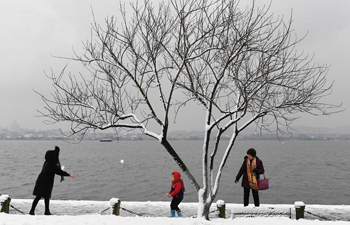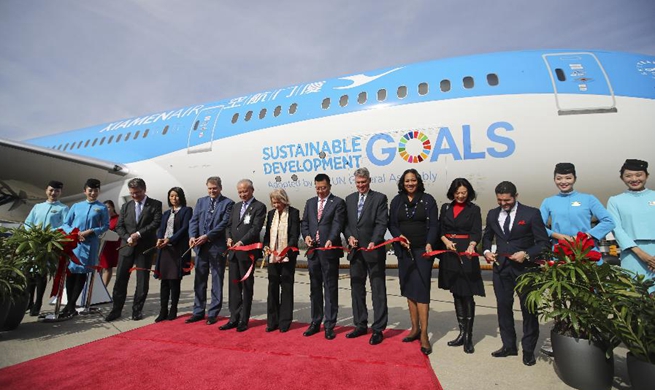BEIJING, Jan. 27 (Xinhua) -- At 8:30 a.m., Wang Suzhong arrives at Chengdu Normal University, removes his clothes, sits in front of a group of students and allows them to sketch his body.
Wang, 88, lives alone in Chengdu, capital of southwest China's Sichuan Province. He began working as a figure model in 2012, when he lived on a monthly pension of about 700 yuan (110 U.S. dollars).
"I can make 70 yuan a day with my clothes on, and 100 yuan naked," he said in a viral video. "This is art, and I am not ashamed."
Wang recently caused a stir online, after his story was shared by Pear Video on microblogging site Sina Weibo. As of 11 a.m. Friday, the video had received around 10,000 comments and 90,000 likes.
Figure modelling is still considered a "disgraceful job" by many Chinese, and conservative attitudes prevail as the "naked models" are required to remove their clothes in public.
Models usually pose for students in art schools, especially those studying painting and sculpture, but the number of figure models is quite limited, partly due to traditional views about the job and the low income it earns.
According to a 2012 report by Chengdu Economic Daily, up to 1,000 art students work with a group of less than 20 older models. The models receive about 20 yuan per class, almost the same they did a decade ago.
Wang said he sits in class for eight hours a day, but it is better than sitting alone at home watching TV.
"The students talk to me, and the teachers really care about me," he said. "They tell me to drink more water and rest well."
Wang said over the years he has worked as a figure model, his children have not once visited him.
"They think my job makes them lose face and they are angry about it," he said.
However, Wang said he continues to pose for art, despite strong objections from his children.
"I do not steal, I do not rob, and I do not cheat," Wang says. "There is nothing wrong with this job."
The story also fueled a heated discussion about the situation of China's "empty nesters," parents whose children have grown up and left home.
"I respect the old man for pursuing his dreams," Weibo user Zhanbushimiya commented.
"What are his children thinking? Shouldn't they support him when he is so old?" said another Weibo comment.
China has an aging population. Those aged over 60 made up 16.7 percent of the population at the end of 2016, and by 2030, they are expected to account for about 25 percent.
The number of empty nesters is rapidly growing and being intensified by young people leaving their rural hometowns to seek opportunities in the city. In big cities, the problem is no less serious, particularly among families with well-educated children as their offspring often go abroad.
According to a 2015 report released by the National Health and Family Planning Commission, in a country where adult children traditionally continue to live with their elderly parents after marriage, empty nesters now account for about 50 percent of those aged over 60, with 10 percent living alone.
Zhai Zhenwu from Renmin University of China, said that while the government should provide more comprehensive care for senior citizens, it is also necessary to encourage young people to maintain closer communication with their parents.
"Seniors need more emotional support from their children," said Du Peng from Renmin University of China.

















